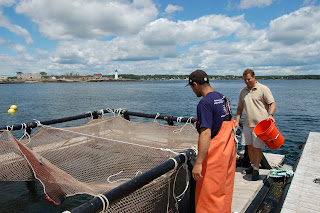The NHSG Fisheries and Aquaculture team is always seeking ways to improve fishing operations while maintaining a healthy marine environment and sustainable fish stocks for the future. One of their recent endeavors is to develop a methodology for rainbow trout aquaculture. Trout grow much more quickly than cod or haddock in offshore pens--the trout can grow to market size of 3 or 4 lbs. within six months, while cod and haddock take up to two years to reach market size. However, trout need to gulp air occasionally to regulate their air bladder for buoyancy and swimming ability. This limits how long the offshore pens can remain fully underwater, so Michael is conducting experiments to determine the optimum length of time to keep the pens submerged while preventing the trout from being negatively impacted by it.
Dick Prunier, owner/operator for the Sumner Brook Trout farm in Ossipee, N.H., delivered 800 rainbow trout to the Judd Gregg Marine Research Complex in New Castle. With help from NHSG Doyle Fellow James Quadrino, Dick transferred the trout into buckets at the top of the pier.
NHSG marine aquaculture specialist Michael Chambers lowered the trout to technician Jess Cranney below. The trout were divided up into a few different pens beneath the pier.
These trout will be used in short-term experiments to determine the impacts of salinity and fish density on the species.
After transferring the trout to the pens beneath the pier, James and Michael headed out by boat to the fish pens moored just south of the Portsmouth Harbor Lighthouse. There are 140 additional trout in these offshore pens that need to be fed. Later in the summer, Michael will transfer the feeding and pen maintenance duties to a handful of local fishermen who will be in charge of growing the trout until they are ready for market. The fishermen will be able to keep the profits. The goal is to teach local fishermen about aquaculture as a way to supplement their income and provide another local, healthy and sustainable seafood choice to consumers.
The mooring lines for this pen also act as a suitable spot for mussels to grow and filter the water near the fish. The mussels that grow in these offshore waters are delicious and tender, too.
Michael checked out the various seaweed species and mussels growing alongside the wooden platform surrounding the pens. Although he hasn't yet run the calculations, he said it would be possible to estimate how much nitrogen and other nutrients the seaweeds remove from the water.









No comments:
Post a Comment